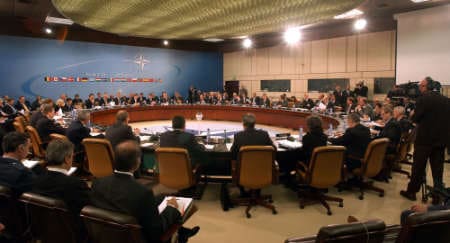Charles Kupchan of the Council of Foreign Relations outlines where NATO has to make some difficult decisions that will be essential to its future

Charles A. Kupchan, professor of international affairs at Georgetown University and Senior Fellow at the Council on Foreign Relations
NATO’s anniversary summit is likely to be dominated by the ongoing mission in Afghanistan. And rightly so. NATO’s ability to forge a coherent strategy, allocate burdens among members, and shore up domestic support for the mission are vital to the alliance’s ability to enhance security and stability in Afghanistan – a goal that will serve as a litmus test of NATO’s effectiveness.
But even as the alliance confronts this immediate challenge, it must also open a searching debate about three over-the-horizon issues that it can no longer afford to push off: its relationship to Russia; its decision-making rules; and the scope of its global ambitions.
On all three issues, NATO members should be guided by realism and sobriety.
With Russia, NATO must seek to avert the continuation of zero-sum competition, instead mapping out a practical vision of programmatic cooperation.
On decision-making, NATO must acknowledge that its growing membership makes reliance on consensus ever more unwieldy, necessitating adoption of a more flexible approach to governance.
As for its global aspirations, NATO must nip such ambitions in the bud, realizing that efforts to turn the body into a worldwide alliance of democracies promise to speed its demise, not its renewal.
Whatever the merits of NATO enlargement – and they are many – the expansion of the alliance has unquestionably come at the expense of its relationship with Russia. To be sure, Russians themselves bear primary responsibility for the recent backsliding on democracy as well as their bouts of foreign policy excess – the war in Georgia most notable among them.
But the perception among Russia’s leadership and its public alike that NATO’s eastward expansion impinges on their country’s security and prestige has certainly not helped matters. Appropriately, NATO seems prepared to put on hold for now its commitment, agreed upon at last year’s Bucharest summit, to offer membership to Georgia and Ukraine. But the mere prospect of Ukrainian and Georgian membership continues to contaminate NATO’s dialogue with Russia.
The way out of this bind is to find a formula for encouraging Moscow to become a stakeholder in Europe’s security order, making Russia a participant in rather than an object of NATO’s evolution. The Cold War has been over for two decades; it is high time for NATO to make a serious effort to bring Russia into the post-war settlement. Moscow may well decline the offer in favor of estrangement with the West. But at least NATO will have done its best to avert that outcome.
With Russia, NATO must seek to avert the continuation of zero-sum competition
At this point, the immediate goal is not finding the precise formula for reaching out to Moscow, but beginning a strategic conversation that makes clear that NATO members are sincerely committed to anchoring Russia within the Euro-Atlantic community. The conversation can begin by exploring ways to make more of the NATO-Russia Council. NATO members should pick up on Moscow’s call for fresh thinking about a “new European security architecture.” This dialogue must be backstopped with concrete strategic cooperation on issues such as missile defense, access to Afghanistan, and diplomacy with Iran.
Ongoing enlargement also forces the issue of the need to reform decision-making in an alliance that has 26 members and counting. As its ranks grow in number and diversity, continued reliance on consensus may well become a recipe for paralysis. Reinforcing the need for reform is the changed strategic landscape in which NATO operates – one whose complexity has attenuated the solidarity that NATO enjoyed during Cold War.
The sharp disagreements that have arisen over Afghanistan, over the urgency of offering membership to Georgia, and over relations between NATO and Russia are not fleeting differences that will soon disappear. Rather, they are by-products of the inevitable divergence of interest and threat perception that has accompanied NATO’s adaptation to the post-Cold War world.
The key question for the alliance is not whether such differences can be overcome, but whether they can be tolerated. Like it or not, NATO is growing more unwieldy and a consensus more elusive.
Such divergence of perspective among member states hardly spells NATO’s fracture, but it does mean the alliance must adjust accordingly how it reaches decisions. Members are unlikely to give up the consensus rule on matters of war and peace. However, on most other issues, it is time for the alliance to forge a more flexible approach to decision-making. NATO should also consider various forms of opt outs to ensure that the intransigence of individual members on specific issues does not stand in the way of effective action.
Finally, members would be wise to begin addressing the calls – coming primarily from American voices – to extend NATO’s reach beyond Europe and transform the body into a global alliance of democracies. Recasting NATO’s relationship with Russia and reforming decision-making require careful deliberation. The proposal for NATO to go global does not; it should be readily dismissed.
NATO has its hands full in Afghanistan; indeed, its ability to prevail remains open to question. With the Afghan mission so straining NATO’s resources and cohesion, it is hard to imagine that the alliance is ready to take on additional commitments further afield. NATO should by all means forge strategic partnerships with countries and regional groupings willing to contribute to the common cause; the help of non-members in Afghanistan is more than welcome. But making NATO the institution of choice for dealing with conflicts around the world is a bridge too far.
NATO’s sixtieth anniversary comes at a time of challenge and strain for the Alliance
In the Balkans, Caucasus, and Europe’s far east – as well as in Afghanistan – NATO has much unfinished business. It had better focus on completing these tasks before packing up for new missions in Kashmir or the Gaza strip. Moreover, extending NATO membership to the likes of Japan, Australia, and Israel would not only prove uniquely contentious for the alliance but also saddle it with commitments likely to go unmet.
To be sure, NATO has an important role to play beyond Europe; it is already developing linkages in the Mediterranean. But prudence requires that NATO focus primarily on helping others help themselves – providing assistance and training, serving as an institutional model, on occasion partnering with local states in limited missions – all to the service of standing up other security organizations around the globe that can be as successful in their own regions as NATO has been in Europe.
NATO’s sixtieth anniversary comes at a time of challenge and strain for the alliance. Against the backdrop of the mission in Afghanistan, NATO would be wise to consolidate its gains by reaching out to Russia, updating its decision-making to reflect its broader membership, and recognizing the limits of its own success.

